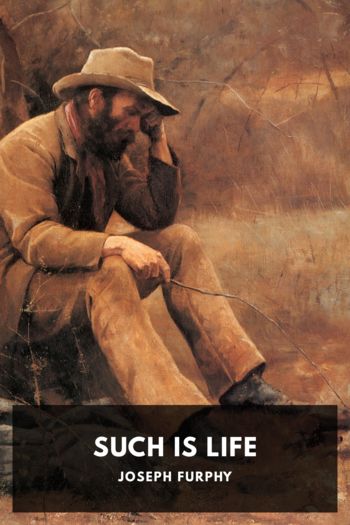Such Is Life - Joseph Furphy (philippa perry book txt) 📗

- Author: Joseph Furphy
Book online «Such Is Life - Joseph Furphy (philippa perry book txt) 📗». Author Joseph Furphy
And now, thought I, as I recovered Alf’s saddle and bridle, heaven grant that that parting may be a Kathleen Mavourneen one; and let me have some other class of difficulty to deal with next time.
Thus, in the best of spirits, owing to the prospect of some smooth travelling on my main trunk line, after having traversed the steep and crooked section to which I had been committed by one touch of the switch two hours before, I made my way through the lignum to Alf’s camp; guided partly by the instinct which we share unequally with the lower creation, and partly by the smell of the dead dog, zephyr-borne on the night air. After dragging the poor animal’s body a little distance away, I vaulted into the wagon, and spoke cheerily to Alf.
No reply. I struck a match, and saw him sleeping the peaceful, dreamless sleep of a tired child. I lit a bit of candle I had noticed in the daytime, and sat down to note his progress in a professional way. His pulse was right, as I found by timing it with my own; and the hard swelling of the elbows seemed to have relaxed a little. The backs of his hands were pretty bad with the external scurvy known as “Barcoo rot”—produced by unsuitable food and extreme hardship—but that had nothing to do with the complaint which had so strangely overtaken him. His breathing was gentle and regular, though his face was covered with gorged mosquitos. The healthy moistness of the skin showed that my prescription had operated as a sudorific, no less than as a soporific. Altogether, there was a marked diminution of what we call febrile symptoms; and, better still, he had managed to turn himself over since I left him.
I lit my pipe, and contemplated the unconscious outlaw. Without being aggressively handsome, like Dixon or Willoughby, Alf, in his normal state, was a decidedly noble-looking man, of the so-called Anglo-Saxon type, modified by sixty or eighty years of Australian deterioration. His grandfather had probably been something like Sollicker; and the apprehensions of that discomfortable cousin were being fulfilled only too ruthlessly. The climate had played Old Gooseberry with the fine primordial stock. Physically, the Suffolk Punch had degenerated into the steeplechaser; psychologically, the chasm between the stolid English peasant and the saturnine, sensitive Australian had been spanned with that facilis which marks the descensus Averni.
But the question of racial degeneracy, past, present, or to come, troubled its victim very little as he lay there. Indeed, it had never troubled him much. He was one of those men who cannot learn to think systematically, but who make up their deficiency by feeling the more intensely. And now that the unseen Guide had given His beloved sleep, and the stern, defiant blue eyes were veiled, and the habitual frown smoothed from the fine forehead, I found something pathetic in the worn repose of the sleeper’s face.
Presently, drifting into a philosophic mood, I placed my propositions in order, and, by the inductive system applicable in such cases, read his history like a book, right back to the time when, according to a popular, though rather tough, assumption, he had lain helpless and imbecile on his mother’s knee, clad in a white garment about four feet long, and with a pulsating soft place on the top of the bald head which wobbled on his insufficient neck like a rain-laden rose on a weak stalk. Little dreamed that mother, poor mortal! when with tireless iteration she ticked off his extremities;—“This pig went to market; this pig stayed at home”—little did she dream, when she wiped the perpetual dribble from his mouth; when she poured all manner of unintelligible tommyrot into his inattentive and conspicuous ears—little did she then dream that the blind evolution of events would transform her inexplicably valued baby into a scrap of floating wreckage on a sea of trouble; scarcely amounting to a circumstance in the vast and endless procession of his fellow-waifs.
Doubtless, he would soon be on his feet again, but to what end? Merely to resume the old persecuted life, still achieving, still pursuing, that strictly congruous penalty which waits upon the man whose life is one protracted challenge to a world wherein no person except the systematic and successful hypocrite has too many friends, or too good a character. Any fool can get himself hated, if he goes the right way to work; but the game was never yet worth a rap, for a rational man to play. This in clear view of the fact that most people lose more by their friends than by their enemies. But there are few sins more odious than ill-nature; and there’s nothing blessed about the persecution you undergo on that account. Your position is not heroic; at best, it is only pitiable; at worst, it is detestable. Athanasius contra mundum is grand only in cases where the snag is right, and the mundus wrong. Then persecution becomes the second-highest form of blessedness—the highest form, of course, being the ability to turn round and flatten-out the persecutor. Now, if Alf could open the windows of his understanding—But then, one of the gravest disabilities in





Comments (0)